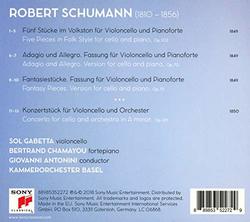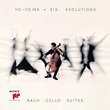| All Artists: Sol Gabetta Title: Schumann Members Wishing: 0 Total Copies: 0 Label: Sony Music Entertainment Release Date: 12/14/2018 Genre: Classical Style: Number of Discs: 1 SwapaCD Credits: 1 UPC: 889853522729 |
Search - Sol Gabetta :: Schumann
 | Sol Gabetta Schumann Genre: Classical The year 1850 was a productive one for Schumann. He had just taken up his new post as director of music in Düsseldorf and it was here, in a veritable frenzy of creativity, that he wrote his Cello Concerto op. 129 in A... more » |
Larger Image |
CD Details
Synopsis
Product Description
The year 1850 was a productive one for Schumann. He had just taken up his new post as director of music in Düsseldorf and it was here, in a veritable frenzy of creativity, that he wrote his Cello Concerto op. 129 in A minor in barely two weeks. Not only was it his first great work for violoncello and orchestra, it remains one of the most frequently performed of all violoncello concertos. As Sol Gabetta notes, it is clear from the work that the great Romantic composer was immensely happy at this time: You can sense Schumanns emotional state in the music. It is all cast from the same mould. Originally described as a Concertstück (concert piece), the work is made up of three movements that are seamlessly joined together, creating a continuous stream of music in which the violoncello is the ideal vehicle for Schumanns musical ideas. The opening movement is notable for its inward-looking melancholy, the slow second movement for its dreamy wistfulness, while the third is a lively, almost folklike envoi. As the violoncellist emphasizes, Schumann was ahead of his time when he wrote this work. Unlike earlier concertos in which the orchestra tended to accompany the solo instrument, the orchestra is now the soloists equal. Sol Gabetta, who was born in Argentina but who now divides her time between Switzerland and Paris, has performed this concerto many times in the course of her international career, of course. But she has now decided to record it for Sony Classical together with a number of other works by Schumann. She is joined by a group of fellow musicians who are among her closest friends. The Cello Concerto was recorded with the famous Basel Chamber Orchestra under the direction of Giovanni Antonini, one of the pioneers of early music. Concerts and recordings with the Basel Chamber Orchestra are like a family reunion for Sol Gabetta: I more or less grew up with this orchestra. It gave me my first big break before I became known as a soloist. I now know every one of the players and weve worked together on numerous projects, growing together until we are now one big family. In 2015 Sol Gabetta made an acclaimed recording of Beethovens Triple Concerto with the orchestra and Antonini as well as with the violinist Giuliano Carmignola and the pianist Dejan Lazic. Sol Gabettas Schumann album also features three chamber works that she recorded in Paris with the French pianist Bertrand Chamayou, with whom she has worked for many years. The works in question are the Fantasy Pieces op. 73, the Adagio and Allegro op. 70 and the Five Pieces in Folk Style op. 102. In 1849, a year before composing his Cello Concerto, Schumann had developed an intense interest in chamber music, an interest that resulted in several different works for a melody instrument and piano. Among them are the Five Pieces in Folk Style op. 102 for violoncello and piano, the Fantasy Pieces op. 73 that were originally scored for clarinet and piano and the Adagio and Allegro op. 70 that were originally intended for horn and piano. But according to Schumann, these intimate character-pieces can also be played on a melody instrument such as the violoncello.
Similar CDs
| Igor Levit Life Genre: Classical Label: Sony Classical | |





![Dolce Duello [Deluxe Edition]](https://nationalbookswap.com/cd//m/06/2806/13362806.jpg)
